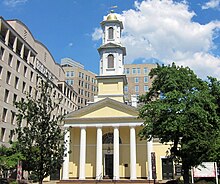Religious affiliations of presidents of the United States
This is an accepted version of this page Religious affiliations can affect the electability of the presidents of the United States and shape their stances on policy matters and their visions of society and also how they want to lead it.
While no president has ever openly identified as an atheist, Thomas Jefferson,[2] Abraham Lincoln,[3][4] and William Howard Taft[5] were speculated to be atheists by their opponents during political campaigns; in addition, a survey during the presidency of Donald Trump showed that 63% of Americans did not believe he was religious, despite his professed Christian affiliation.
[6] Conspiracy theorists also falsely circulated rumors that Barack Obama was a Muslim during his 2004 Senate campaign and later time as President.
Conversely, Baptists are underrepresented, a reflection of their quite recent expansion in numbers; the list includes only two Catholic presidents, although they are currently the largest single denomination.
[10] Deism was a religious philosophy in common currency in colonial times, and some Founding Fathers (most notably Thomas Paine, who was an explicit proponent of it, and Benjamin Franklin, who spoke of it in his Autobiography) are identified more or less with this system.
"[13] William Howard Taft, a Unitarian, said in a letter to a friend, "I am interested in the spread of Christian civilization, but to go into a dogmatic discussion of creed I will not do whether I am defeated or not.
[15] The only other president with any association with a definitely nontrinitarian body is Dwight D. Eisenhower, whose parents moved from the River Brethren to the antecedents of the Jehovah's Witnesses.
Jefferson remained a member of the Episcopal congregation near his home, but removed himself from those available to become godparents, because he was not sufficiently in agreement with the Trinitarian theology.
His work, the Jefferson Bible, was Unitarian in theology ...In some of the delightful conversations with you, in the evenings of 1798–99, and which served as an anodyne to the afflictions of the crisis through which our country was then laboring, the Christian religion was sometimes our topic; and I then promised you, that one day or other, I would give you my views of it.
I am a Christian, in the only sense he wished any one to be; sincerely attached to his doctrines, in preference to all others; ascribing to himself every human excellence; & believing he never claimed any other.
but I have read his Corruptions of Christianity, & Early opinions of Jesus, over and over again; and I rest on them, and on Middleton's writings, especially his letters from Rome, and to Waterland, as the basis of my own faith.
